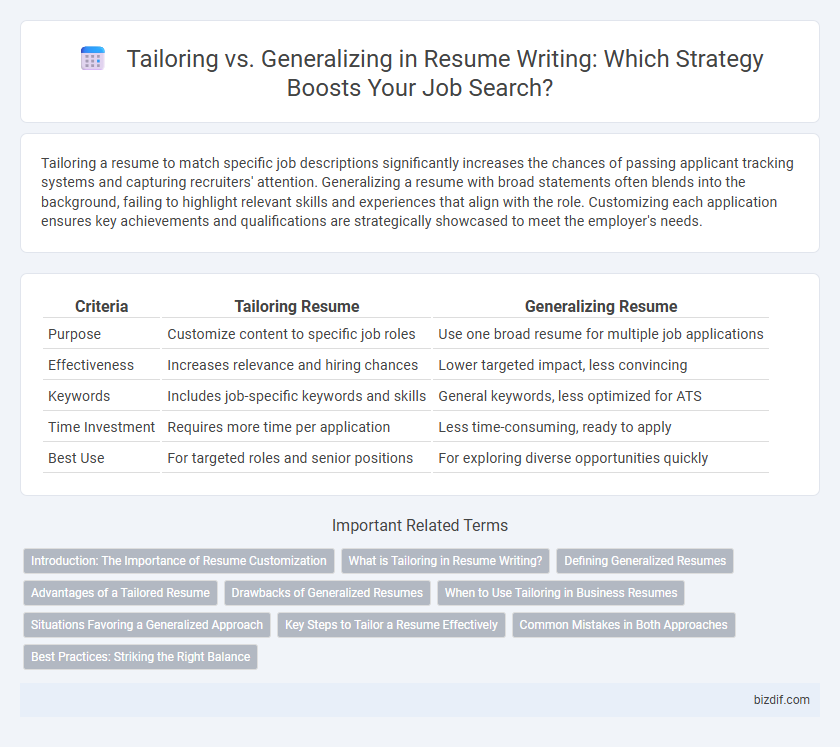Tailoring a resume to match specific job descriptions significantly increases the chances of passing applicant tracking systems and capturing recruiters' attention. Generalizing a resume with broad statements often blends into the background, failing to highlight relevant skills and experiences that align with the role. Customizing each application ensures key achievements and qualifications are strategically showcased to meet the employer's needs.
Table of Comparison
| Criteria | Tailoring Resume | Generalizing Resume |
|---|---|---|
| Purpose | Customize content to specific job roles | Use one broad resume for multiple job applications |
| Effectiveness | Increases relevance and hiring chances | Lower targeted impact, less convincing |
| Keywords | Includes job-specific keywords and skills | General keywords, less optimized for ATS |
| Time Investment | Requires more time per application | Less time-consuming, ready to apply |
| Best Use | For targeted roles and senior positions | For exploring diverse opportunities quickly |
Introduction: The Importance of Resume Customization
Tailoring a resume to match specific job descriptions significantly increases the chances of passing Applicant Tracking Systems by incorporating relevant keywords and skills. Generalizing a resume often leads to generic samples that fail to capture the unique requirements of each role, reducing recruiter interest. Customizing resumes demonstrates attention to detail and alignment with company culture, improving interview call rates by up to 50%.
What is Tailoring in Resume Writing?
Tailoring in resume writing involves customizing your resume to match the specific job description and employer requirements, highlighting relevant skills and experiences that align with the role. This approach increases the chances of passing applicant tracking systems (ATS) by incorporating targeted keywords and phrases from the job posting. Tailored resumes demonstrate a focused application, making it easier for hiring managers to see your suitability for the position.
Defining Generalized Resumes
Generalized resumes provide a broad overview of skills and experiences without targeting a specific job or industry, making them suitable for multiple applications. They emphasize versatile qualifications and transferable skills to appeal to a wide audience of employers. However, their lack of customization may reduce relevance in competitive job markets compared to tailored resumes.
Advantages of a Tailored Resume
A tailored resume highlights relevant skills and experiences that directly match the job description, increasing the chances of passing applicant tracking systems and catching recruiters' attention. Customizing each resume version allows for strategic keyword usage, improving visibility in competitive job markets. Employers perceive tailored resumes as a sign of genuine interest and professionalism, boosting the candidate's credibility and suitability for the specific role.
Drawbacks of Generalized Resumes
Generalized resumes often fail to highlight specific skills and experiences that match the job description, reducing the chances of passing applicant tracking systems (ATS). They can appear vague and impersonal, making it difficult for recruiters to assess a candidate's suitability quickly. This lack of customization usually results in lower interview callback rates compared to tailored resumes crafted for each position.
When to Use Tailoring in Business Resumes
Tailoring business resumes is essential when applying for positions that require specific skills, industry knowledge, or job responsibilities, as it highlights relevant achievements and keywords that align with the employer's needs. Customizing resumes for each role improves applicant tracking system (ATS) performance and increases the likelihood of passing initial screenings. Use tailoring when targeting niche markets, specialized roles, or companies with unique cultures to demonstrate a strong fit and enhance credibility.
Situations Favoring a Generalized Approach
A generalized resume works best in industries valuing versatility and wide-ranging skills over niche expertise, such as entry-level roles or positions in startups. Broadly applicable experience highlights adaptability and a diverse skill set that appeals to employers seeking potential rather than specific past tasks. This approach reduces the need for constant resume revisions when applying to multiple job types, streamlining the application process and enhancing efficiency.
Key Steps to Tailor a Resume Effectively
Identify relevant keywords from the job description and incorporate them naturally into your resume to pass applicant tracking systems (ATS). Highlight specific accomplishments and skills that align directly with the role, ensuring quantifiable results to demonstrate impact. Customize your professional summary and experience sections to reflect the employer's priorities, thereby increasing the chances of securing an interview.
Common Mistakes in Both Approaches
Tailoring a resume often leads to excessive customization that overlooks transferable skills, while generalizing results in vague descriptions failing to highlight specific achievements and industry-relevant keywords. Both approaches commonly neglect quantifiable metrics, diminishing the resume's impact and ATS compatibility. Balancing targeted content with clear, measurable outcomes is essential to avoid these pitfalls and improve job matching accuracy.
Best Practices: Striking the Right Balance
Tailoring a resume to specific job descriptions increases keyword relevance and improves applicant tracking system (ATS) compatibility, enhancing interview chances. Generalizing allows flexibility across various roles but risks diluting impact and failing to highlight critical skills for targeted positions. Best practices involve customizing key sections like summary, skills, and accomplishments while maintaining a consistent format to strike the right balance between specificity and versatility.
Tailoring vs Generalizing Infographic

 bizdif.com
bizdif.com